Summary: I stopped only delivering supplies and tried truly showing up at Tent City. We treat our first injury there. I got invited to go fishing, and a ton of tackle showed up. For the first time, we didn’t have enough to do our outreach, and then something unexpected happened in the final hour.
Read Time: Approximately 20 minutes.
In March, I spent some time living as one experiencing homelessness in our community. After returning from my trip, I spent more time at Tent City. On several occasions, I went by myself and felt quite comfortable. Some of these encounters changed me in ways I had not anticipated.
One afternoon after work was a good example of that. I had stopped by Tent City to deliver needed supplies to a long-term resident with whom I have a good rapport. When I exited my truck, I changed shirts and put on my cap. Consistency in appearance helps in this role, in that I want to be recognized. The man I had come to see arrived, and by chance, he was wearing a shirt I had given him on my previous visit. It was one of my favorite shirts, as the person who gifted it to me is special to our family. I gave him the supplies, which he graciously accepted. I reached into my truck, grabbed my blue, ironed dress shirt, and offered it to him as well. Suddenly, the atmosphere shifted. I had inadvertently stepped over a boundary. “I already have your favorite shirt,” he says as he points to his chest. His head drops.
“Next time you come here, don’t come with anything to give.” Our eyes meet, and I see the beginning of tears. “Come down here and hang out with me. Go fishing with me.” He explained how his fishing gear was lost in the flood, and we went our separate ways.
As you might have imagined, that caught up with me later that evening. It was clear that he was asking for something valuable. Time. I am not proud of it, but I fear stepping past the line where compassion becomes connection. Where it’s no longer “them” and “me,” but us, where I can’t just serve and leave—I sit, I cast a line, and I stay.
A few days later, our outreach was at Tent City, as regularly scheduled, on the last Saturday of every month. The same man was there, joined by another who asked me to go fishing with them. If they had fishing poles. You might think that was enough of a sign. Right? Nope. I’m fighting it.
Many days after our outreach, a first-time volunteer (who happens to be a nun and a nurse) and another woman (by chance, also a nurse) entered my shop one day carrying a ridiculous amount of fishing gear. You can’t make this up, nurses and a nun, with fishing gear, at a computer shop. This isn’t the cheap stuff you might have gotten as a kid; they’re nice rods with all the tackle. I’ve never heard the voice of God. But it seems he’s saying, “You’re not getting off that easy.” I’m not sure I like this at all. But that’s been the case when God puts something in my path; it’s expected to be uncomfortable.
One of the times that I visited was with my wife, Kim. We found a resident with an infected wound on his hand. He doesn’t want to go to the emergency room. Kim is a nurse, and we had first aid on hand. We fixed him up the best we could.
I followed up with him a few days later and did my best to reenact what my wife had done. It was a surreal moment. It was a privilege to kneel at this man’s seat and clean his wound. It reminded me of this verse: (of course, I had to look this up) “Truly I tell you, whatever you did for one of the least of these brothers and sisters of mine, you did for me” (Matthew 25:40). I work on machines for a living. What am I doing here, playing doctor?
But this month’s outreach almost didn’t happen as it did. For the first time, we did not have enough. Part of me accepted that we had enjoyed a long run and were “due” for a dry spell. Additionally, it looked like we would be shorthanded. I decided to scale back and not visit anywhere other than the bare minimum. A few days (four, to be exact) before we were to distribute the things we didn’t have, I made a desperate plea on social media.
If your faith in humanity has been questionable lately, let me assure you our community will respond massively when needed. Or, if you’re a believer, you might say God showed up at the last minute. Metaphorically, our nets got so full we thought the boat would tip over. One of our volunteers worked several days doing nothing but sorting, boxing, and labeling. Each day, I’m secretly surprised she has returned. Another couple gave up most of their day doing the same. There are a lot of moving parts and people involved. We’re always needing more help.
Our mobile outreach arrives, as scheduled, at the Cadillac Motel on Saturday, April 26th. There are a lot of people who are there to help. We have many food and hygiene products on the tables our volunteers had set up for people to choose from. There’s almost every conceivable canned vegetable, fruit, and meat that folks like you have donated for us to redistribute for this event. More profound than that, there’s fresh, ready-to-eat food. A husband-and-wife team who, I guess, stayed up all night, brought a crazy amount of sausage biscuits they had made. Sheppard’s Hand, a ministry we partnered with, provided as many sack lunches that included a “real” homemade ham sandwich, chips, and a cookie.
For the first time since we started this outreach, we provided breakfast and lunch, plus a bunch of nonperishable food to take home. I say “we,” but it’s clear that God had this all planned out. If I were to tell you how this supernaturally fell together, I doubt you’d believe me. But I’ll say this: There’s confirmation of it all over the place. Five days before, I didn’t think it would happen in the first place.
After that, we head to Tent City. While everything was being set up, I put on my boots and searched for people who lived there. I find the usual, a mixture of long-term residents and some new faces who are probably just passing through. Some residents told me that no one had reinhabited the area destroyed by flooding. However, I have learned from experience that not everyone wants you to find everyone, so I embarked on the path to the devastated area to see for myself.
Let me try to describe what that is like. As far as you can see, the wooded area is covered in mud. As you look over the horizon, occasional patches of earth are beginning to form cracks in the surface, just beginning to dry. Thankfully, my footwear tolerates the three inches of mashed potato consistency. Once your boots sink through that, it’s fairly stable but much thicker.
There’s a baby stroller, probably one used to transport goods, partially consumed by the soft earth. There is a home here that is occupied. It’s a little more toward the higher ground, if there were a thing here. But to overcome the unstable foundation, they have built upon a large, thick tarp folded over like a napkin and anchored at each end. Upon that is a tent, which is covered by another larger tarp, suspended by ropes. A part of me feels pretty good about that. I recognize all these things; our outreach would’ve made this available. One of our totes is here, possibly used to keep something dry. It all made it where we had hoped and needed it most.
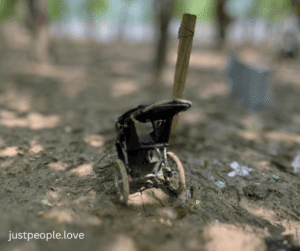
I can see there are a few recently occupied tents. Behind one, a dog tethered to something I cannot see quietly watches me. I found out later that the pet was not the only one watching. This is a sobering reminder that I ought to be careful thinking that I am alone, at any moment. A man approached me later at our trailer and mentioned that he saw me, but he was new and didn’t know who I was. He asked for a tent, which tells me that when he saw me, he may not have been inside one. I am so unaware of my surroundings.
Off in the distance, I see two people approaching. I recognize the man and woman struggling to make it to me. He’s dragging a wagon and a sled. The relentless mud consumes one of her shoes, and her foot slips out. It’s a mess.
I take the sled, and he drags the wagon, and we head to higher ground, which consists of jagged rocks. When the terrain gets too rough, he lifts her onto his back and carries her the rest of the way so that she won’t hurt her feet. How do you explain that kind of gesture? You don’t. You witness it. No speech. No audience. Just love that moves without needing to be seen. Raw. Protective. Sacred in a way that sneaks up on you. And if you’re paying attention, it marks you.
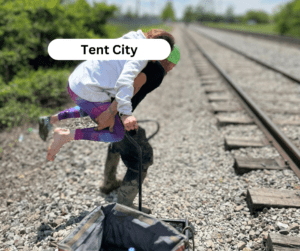
But these two know from experience what awaits them, so they’re determined to get there. We have shoes for her and enough food, hygiene supplies, tarps, and duct tape to fill the sled and wagon. Now, their challenge is to get it where it needs to go. I have no idea how this man will transport that weight through the terrain we just came from.
Before we departed, I had wanted to reach one area. The terrain fights me the whole way when I visit here—sharp inclines with a stretch of crushed rock, exposed roots, and deep, washed-out ruts streaking down the embankment. It’s like a warning. No trail. No mercy. Each step has its punishment. This wasn’t a place meant to be traveled on foot. But it was home to a man we’d been watching, ever since he cut his hand a while back.
I call for him, and his voice echoes inside the tent. He sounds weak. I’d set a hard rule—never enter a dwelling alone. But this time, I stepped over that line. My wife would kill me if she knew.
He was lying under a tangle of covers, pale and still. Something wasn’t right. When he asked for water, I told him I’d bring it. I’m no doctor, but his cracked lips and sunken face told me enough. The man was dehydrated, maybe worse.
When I got back to the site we’d set up, everything was already packed and ready to roll. We’d given out the fresh water we brought, and truthfully, I wouldn’t have been able to carry more than a couple of sixteen-ounce bottles back to him anyway—not over that terrain.
It stings. It feels like failure. But the longer you do this, the more you learn: you won’t reach everyone. Not every time. And that truth doesn’t make it easier—it keeps you from breaking.
I wish I had a clean ending. I don’t.
That man in the tent needed water that day—but the truth is, they all do. Every day. Water to drink. Water to clean a wound. Water just to feel human again. But there is no source of drinking water here. And it’s not just water—it’s hope. Dignity. Rest. A reason to believe someone still sees them.
That terrain? The one that feels like it nearly breaks me getting in and out? That’s the daily path they walk. Hauling wagons. Sleds. Their whole lives dragging behind them through mud and rocks. And when we can’t reach them, not because we don’t care, but because we physically can’t—it doesn’t feel like an inconvenience. It feels like failure.
We need help. Not someday—now.
We need an all-terrain vehicle to get these much-needed goods where they’re most needed. Bulk drinking water doesn’t mean anything if we can’t get it to the ones who need it most. Suppose you have an ATV that you no longer need, or perhaps you would consider purchasing one, know that your gift is tax-deductible. This isn’t about equipment. It’s about survival. It’s about worth. It’s about saying, without hesitation: you matter enough for us to come back.
Even when the road is brutal.
Even when we fall short.
Even when all we can offer today… is the promise that we’ll keep trying tomorrow.
In closing, I want to let you know that today, the day I completed writing this, I visited Tent City and verified in person that the man was okay. He was visiting neighbors at a more accessible location, and I gave him the water I promised him. I went fishing with a couple of them and spent the afternoon visiting.
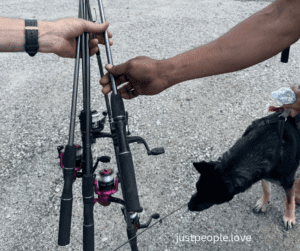
All of the real names used here were with permission. Otherwise, the names have been changed. To protect the identity of those photographed, they have been blurred intentionally unless consent was given before publishing.
The Safer Kentucky Act, which went into effect on July 15, 2024, makes sleeping or camping in public areas illegal, including on sidewalks, roadsides, under bridges, or in parks, parking lots, garages, or doorways. The law creates a new offense called “unlawful camping” that can result in arrest and fines. Assisting those individuals is considered to be aiding and abetting, which is a legal doctrine that refers to the act of helping or encouraging someone to commit a crime. The person who aids and abets is generally held to the same degree of criminal liability as the person who commits the crime. We ask that you please not attempt to locate or visit Tent City.
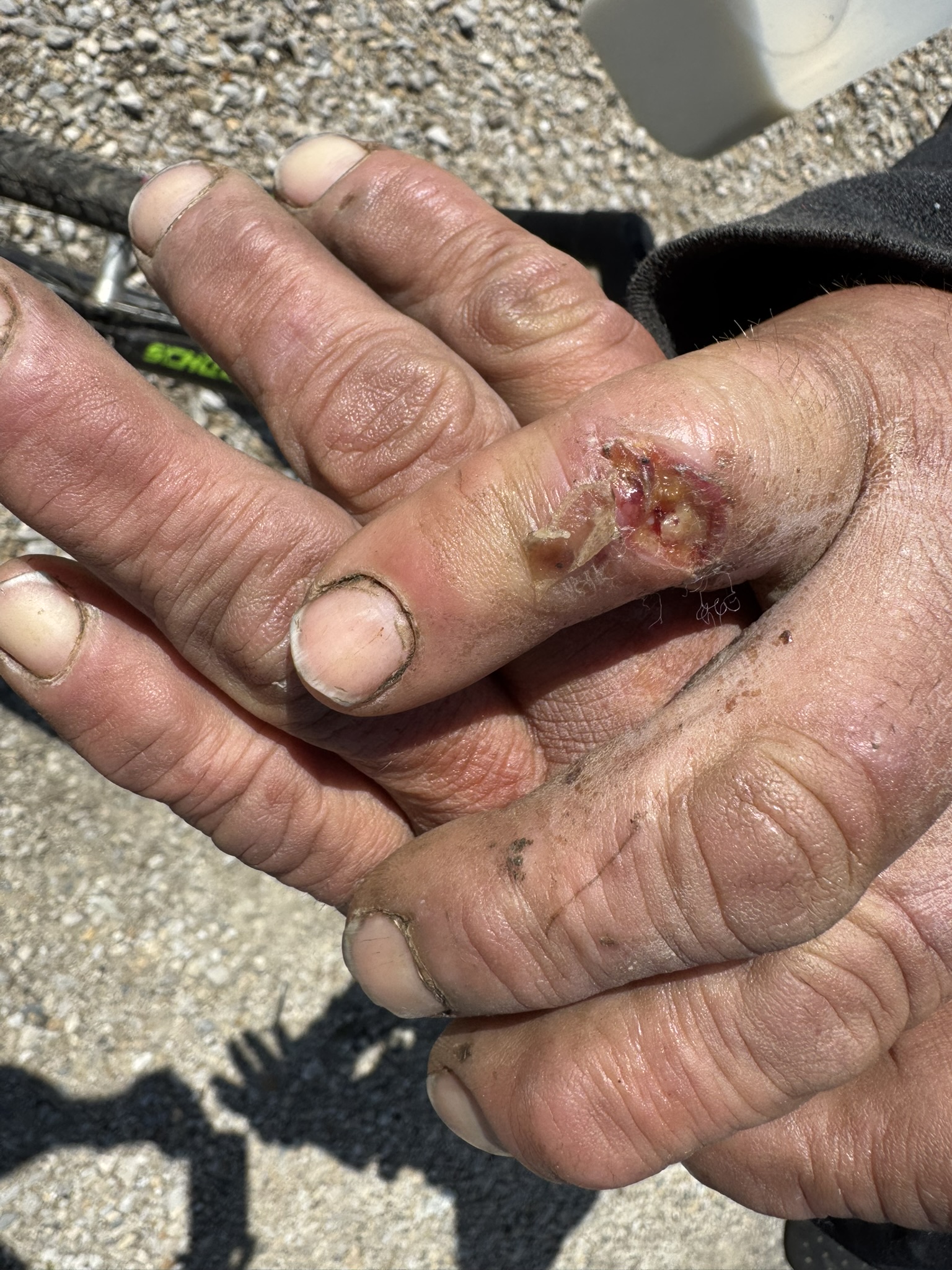
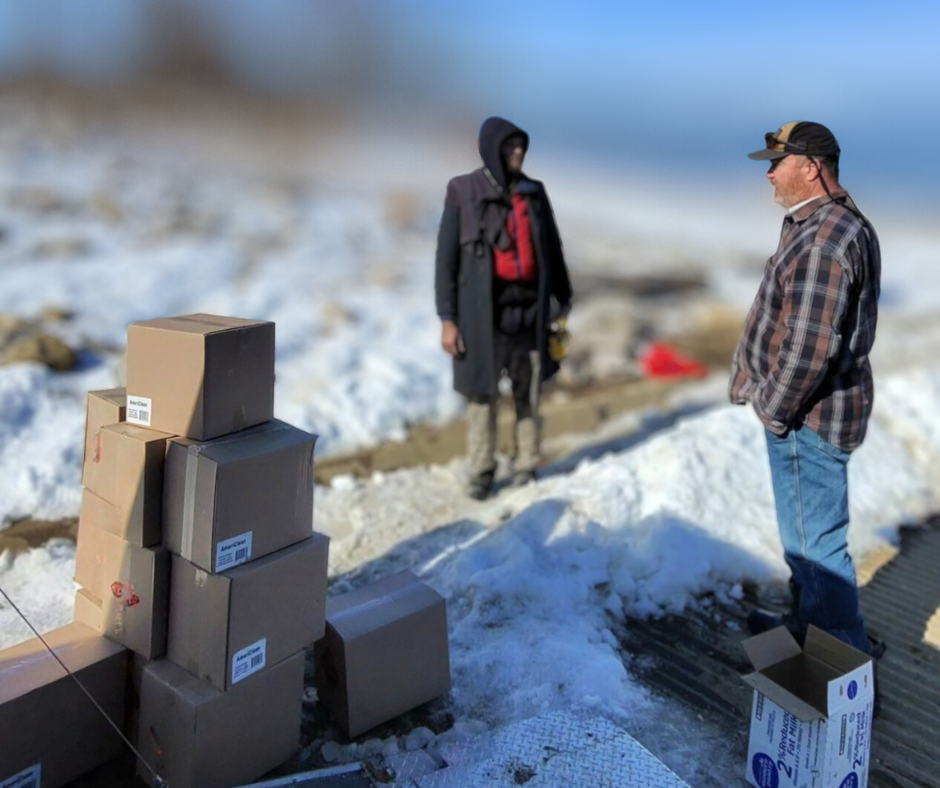
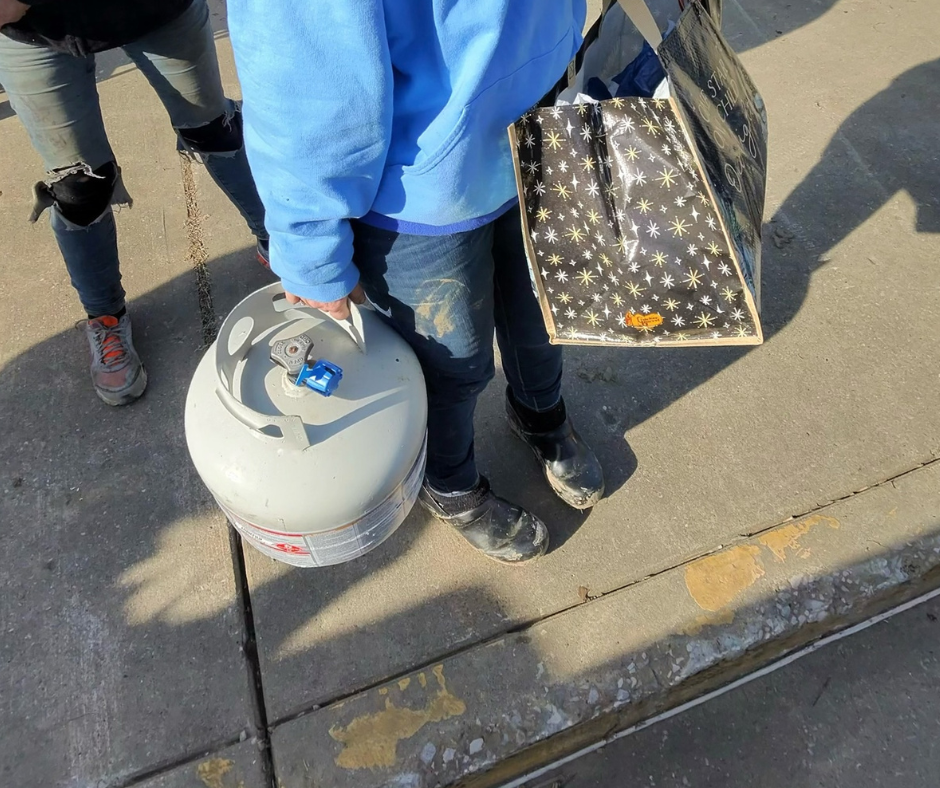
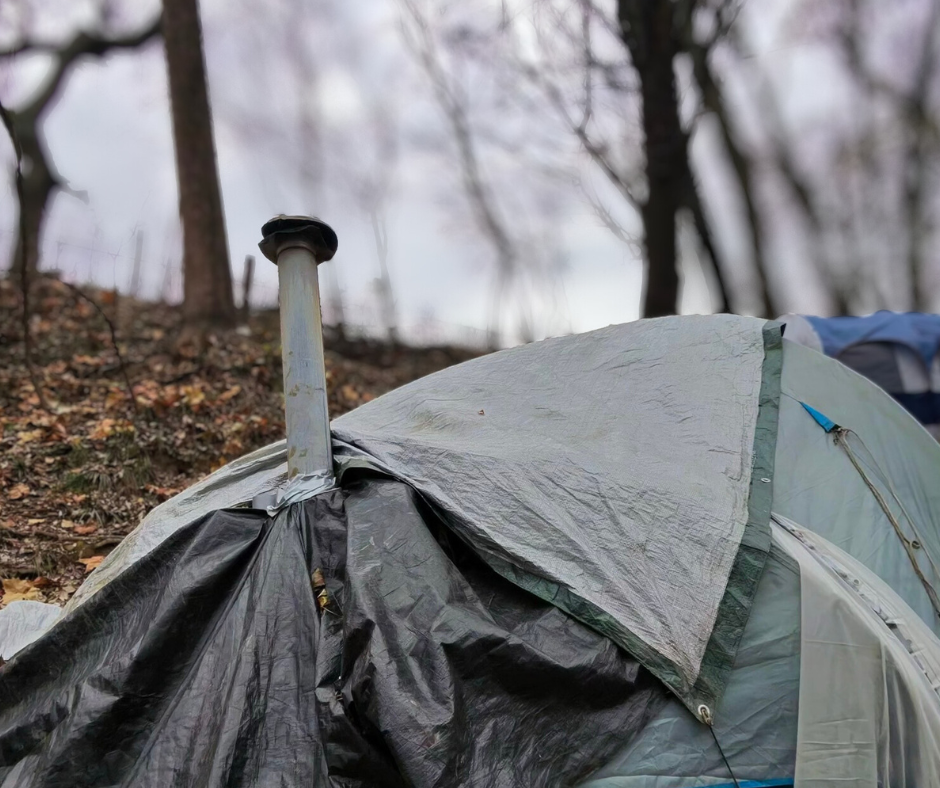
A valuable lesson we (who work with outreach) often never learn, it’s should never be only about giving away “stuff”, it’s about relationships and giving them our most precious resource, our time.